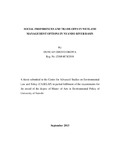| dc.description.abstract | The Nyando River basin provides important ecosystem goods and services on which the basin’s community rely for livelihood. However, the basin has faced some of the most severe forms of unsustainable use, which has reduced its ability to provide the needs of a growing population. A number of specific interventions have been initiated to reverse the situation. However, most of these have pursued different resource use options without knowledge of the values that residents attach to the different wetland uses, and thus their preferences for different management options. Among the key hindrances to sustainable management of the basin is lack of knowledge of the economic values of the basin’s different wetland uses. This study sought to elicit the values of the key wetland uses in the lower part of the basin, and the residents’ relative preferences for alternative management interventions in the basin.
Four environmental attributes that reflect the variety of economic benefits of Nyando River basin (NRB) were identified. They are: flood risk reduction, agricultural yield improvement, employment creation and water quality improvement. A choice experiment (CE) was conducted to estimate the value of changes in each of these wetland functions. A household survey was conducted in March 2012, using a semi- structured questionnaire, with questions on perceptions on NRB degradation, the choice experiment, and socio-economic characteristics. STATA 11 was used to run a basic multinomial logit (MNL) model showing the importance of the attributes in explaining respondents’ choices, and a second model explaining the importance of socioeconomic characteristics in the respondents’ choice decisions.
Results show that the two greatest contributors to residents’ welfare are agricultural yield improvement and employment creation, with annual MWTP values of KSH 5.57 billion and KSH 0.51 billion, respectively. The corresponding figure for reducing flooding risk is KSH 0.05 billion, while that of improving water quality is KSH 0.18 billion. The results also show that there are some heterogeneity in preferences as more educated respondents had a higher probability of choosing alternatives with reduced flooding risk, and elder respondents had a higher probability of choosing alternatives with improved agricultural yield. The results further reveal that a wetlands
management option with improved agricultural yield and more employment opportunities attracted the highest MWTP (KSH 6.08 billion per year), while the one with improved agricultural yield and improved water quality had the least MWTP of KSH 5.62 billion per year.
It is concluded that even though the main concern of NRB residents is improvement of agricultural yield, they also derive substantial benefits from employment creation, flooding risk reduction and water quality improvement. As such wetland management programmes should be designed such that the strategies employed to improve agricultural yield also incorporate improvements in the other attributes. It is also concluded that heterogeneity in preferences should be considered in wetlands management in order to ensure social equity. In addition, the study has shown that the management option favoured most by the residents is that which improves agricultural yield and creates employment. Finally, it is demonstrated that choice experiment can be successfully applied to estimate non-market values of wetlands in Kenya. Important policy implications of the study include the need for harmonization of sectoral policies touching on wetlands, and recognition that poverty plays a central role in wetlands management. The information provided by this study can assist wetland managers and policy makers in formulating socially optimal policies and programmes for sustainable management of NRB with possible implications for similar wetland areas in Kenya and the rest of Africa. | en |

